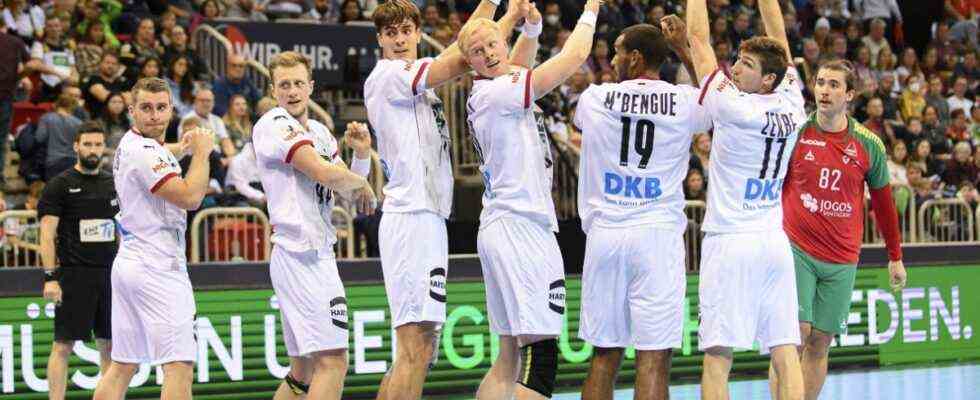Jogi Bitter in the goal, at the Hendrik Pekeler district, in the back area Paul Drux, Juri Knorr and Fabian Wiede, on the outside Uwe Gensheimer or Patrick Groetzki – that would be a first seven with which you could compete with a pretty self-confident European handball championship. Now the life of national coach Alfred Gislason is not always that easy, although he announced his squad for the upcoming handball European championships in Hungary and Slovakia (January 13th-31st) on Tuesday – but one of the names mentioned is no one there.
The reasons are varied: Pekeler, Gensheimer and Co. are pausing in the national team or have declared their careers with the German Handball Federation (DHB) to be over. Others are not quite fit or cite private reasons for rejection; the young, high-dispositioned middle man Juri Knorr is not vaccinated after surviving the corona infection and is therefore not a candidate for the European championship. “That about Juri hit us,” said Gislason on Tuesday about the currently most annoying personnel issue. He would have liked to switch back and forth in the middle position between Magdeburg’s Philipp Weber and Knorr. This tactical means is no longer available. He was “of course not enthusiastic about the rejections,” Gislason confessed, but what should he do?
As requested of him, the Icelander has nevertheless appointed 19 players to travel with him to the European Championship, and a look at the squad shows that a difficult tournament is likely to be ahead. A few warriors have remained, of course, the captain is Johannes Golla from Flensburg, the most experienced player in Kiel’s Patrick Wiencek (150 internationals), goalkeeper Andreas Wolff (Kielce, 116 internationals) and left-hander Kai Häfner (Melsungen, 112) are well known in handball country.
After that, it quickly becomes thin with the established names, only five players are in the squad who also took part in the European Championship victory in 2016. In Hungary and Slovakia there will be a lot of young actors on the record who have not yet been introduced to the broad television audience in Germany – even nine debutants who have not yet played a single major tournament. “Given the circumstances,” said Gislason, “this is the best squad.”
You won’t find many Kiel or Flensburg players in the current squad
It was a difficult puzzle for the national coach, but he already knows it. He has been in office since February 2020 – he has never had the full force together. Not at the 2021 World Cup in Egypt, not even at the Summer Games in Tokyo. There are always players who are fit, but for personal reasons, forego major tournaments. Sports director Axel Kromer said that the association is annoyed “that some national players, for various reasons, do not see their careers as consistently in the national team as is the case in other nations”.
That went to the address of players like Pekeler, who was still an important pillar of the team at the Olympic Games in Tokyo, who is currently taking a longer break and leaves it open whether he will return to the national team. At the half-time break of a grueling season, the Kieler will use January for urgently needed regeneration, while his colleagues continue to play at the EM.
When looking for available national players, Gislasons researched the second row of Bundesliga professionals, even in the second division and abroad. The times of a strong Kiel block are over, the German record champions only have one player in the squad in Wiencek. The goalkeepers Joel Birlehm (Leipzig) and Till Klimpke (Wetzlar), the backcourt players Luca Witzke (Leipzig) and Christoph Steinert (HC Erlangen) and Lukas Zerbe (Lemgo) on the outside are well known to Bundesliga fans. But who is Djibril M’Bengue? A backcourt player from FC Porto. And who is Julian Köster? Young middle man of the second division VfL Gummersbach. Both get on the plane with experience from two international matches.
Two new, fresh faces: goalkeeper Joel Birlehm (left) and backcourt player Djibril M’Bengue.
(Photo: Anke Waelischmiller / Sven Simon / Imago)
Is that enough? Even the preliminary group with the Belarusians, Austrians and Poles is anything but easy; Second place has to be achieved, otherwise the tournament threatens to end very early. Large handball nations such as France, Denmark or Spain currently seem a long way off. “We are anything but a favorite at this European Championship,” said Gislason and even confirmed: “We are not even favorites in our group.” That should be the strong Poles, third German opponent in the final group game.
And so the question arises, what can be expected from this team at the EM. It can surprise positively, of course. “Everyone can now show themselves and play in the foreground”, demanded Gislason: “I am sure that we will be on the record with a big fighter heart from the first second.” Kromer also expects a team with “consistently mercilessly motivated players”, some of whom can now gain important experience that will be useful later on. After all, even more important than the team that will compete in Hungary and Slovakia and try to survive as well as possible is the one that will start at the home European championships in 2024.

